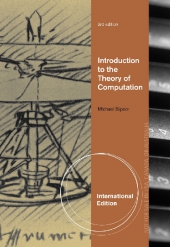 Neuerscheinungen 2012Stand: 2020-01-07 |
Schnellsuche
ISBN/Stichwort/Autor
|
Herderstraße 10
10625 Berlin
Tel.: 030 315 714 16
Fax 030 315 714 14
info@buchspektrum.de |

Michael Sipser
Introduction to the Theory of Computation
International Edition
3rd ed. 2012. 504 p. 235 mm
Verlag/Jahr: CENGAGE LEARNING EMEA 2012
ISBN: 0-534-94728-X (053494728X) / 0-619-21764-2 (0619217642) / 1-13-318781-1 (1133187811)
Neue ISBN: 978-0-534-94728-6 (9780534947286) / 978-0-619-21764-8 (9780619217648) / 978-1-13-318781-3 (9781133187813)
Preis und Lieferzeit: Bitte klicken
Gain a clear understanding of even the most complex, highly theoretical computational theory topics in the approachable presentation found only in the market-leading INTRODUCTION TO THE THEORY OF COMPUTATION, 3E, International Edition. The number one choice for today´s computational theory course, this revision continues the book´s well-known, approachable style with timely revisions, additional practice, and more memorable examples in key areas. A new first-of-its-kind theoretical treatment of deterministic context-free languages is ideal for a better understanding of parsing and LR grammars. You gain a solid understanding of the fundamental mathematical properties of computer hardware, software, and applications with a blend of practical and philosophical coverage and mathematical treatments, including advanced theorems and proofs. INTRODUCTION TO THE THEORY OF COMPUTATION, 3E, International Edition´s comprehensive coverage makes this a valuable reference for your continued studies in theoretical computing.
Introduction. Part 1: Automata and Languages. 1. Regular Languages. 2. Context-Free Languages. Part 2: Computability Theory. 3. The Church-Turing Thesis. 4. Decidability. 5. Reducibility. 6. Advanced Topics in Computability Theory. Part 3: Complexity Theory. 7. Time Complexity. 8. Space Complexity. 9. Intractability. 10. Advanced Topics in Complexity Theory. Selected Bibliography.
Sipser, Michael
Michael Sipser has taught theoretical computer science and mathematics at the Massachusetts Institute of Technology for the past 32 years. He is a Professor of Applied Mathematics, a member of the Computer Science and Artificial Intelligence Laboratory (CSAIL), and the current head of the mathematics department. He enjoys teaching and pondering the many mysteries of complexity theory.


